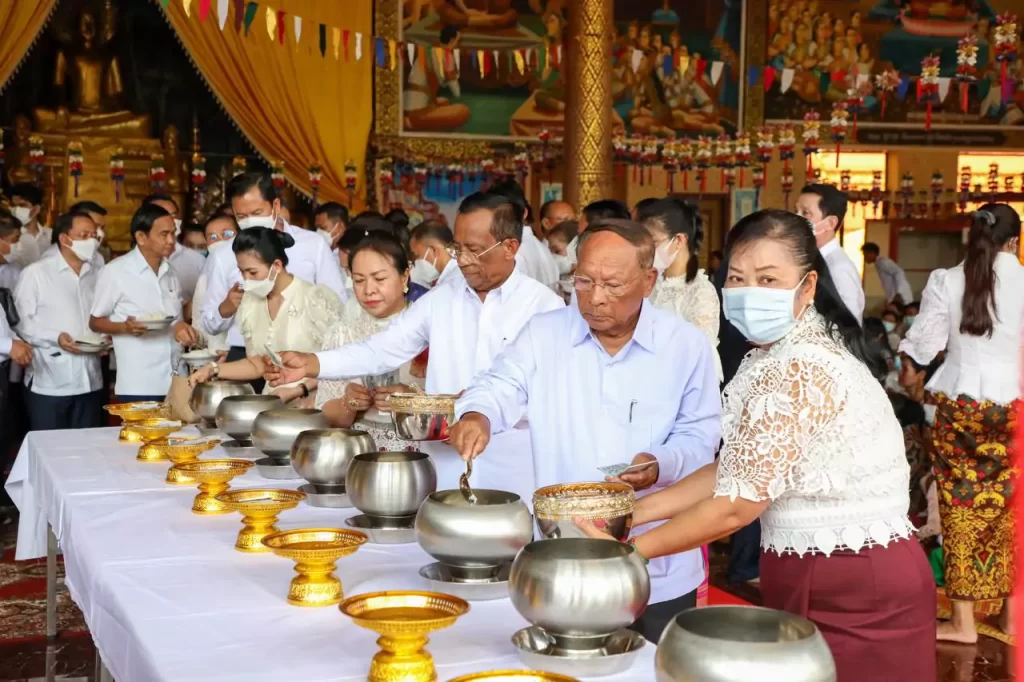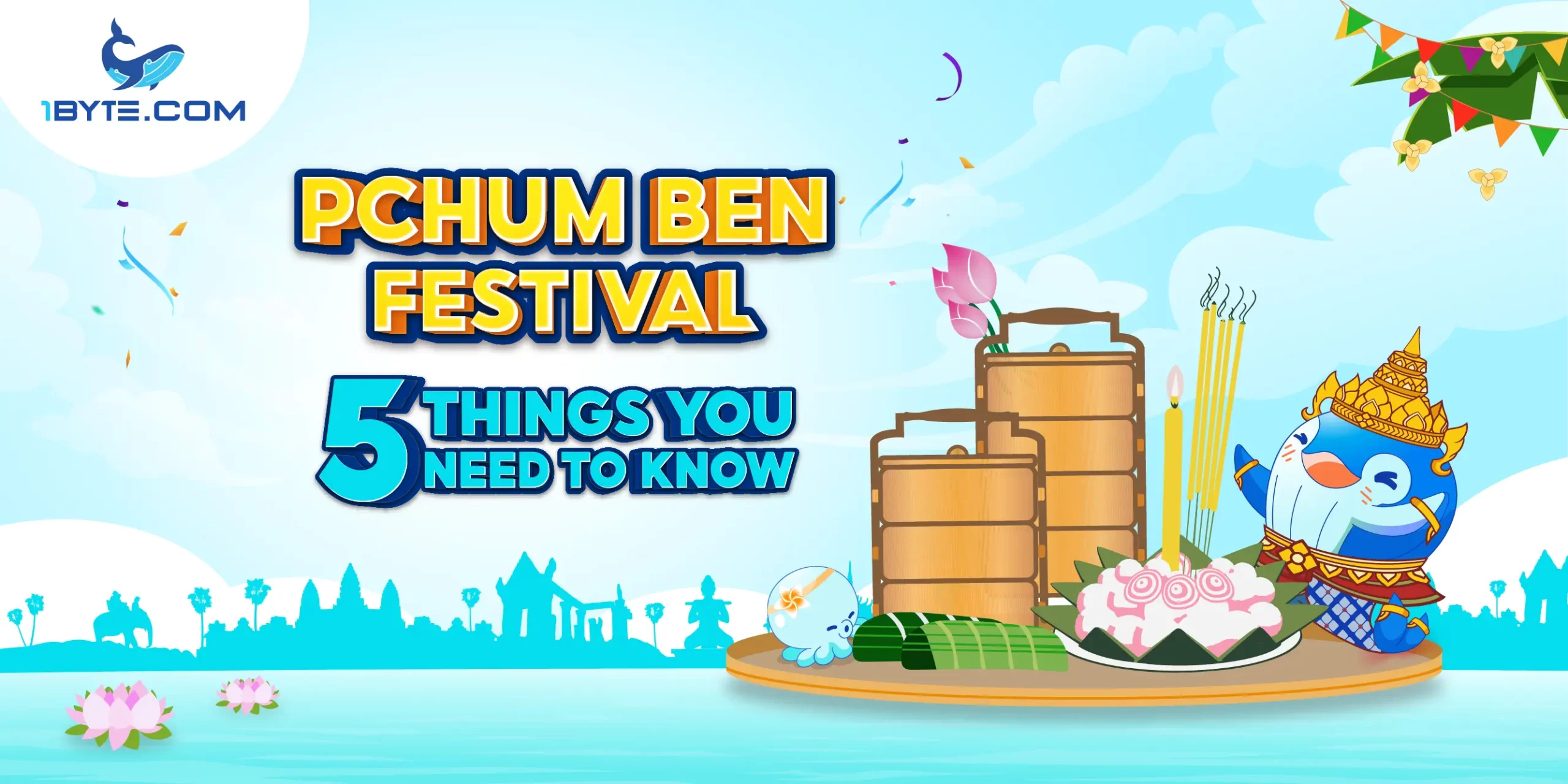As Cambodia’s leading cloud and hosting provider, 1Byte is thrilled to share insights about the upcoming Pchum Ben Festival 2025. This important Cambodian tradition holds immense cultural significance. In this article, 1Byte will guide you through five key aspects of Pchum Ben Festival, ensuring you have a comprehensive understanding of this cherished event.
Meaning of Title
In the Khmer language, the title “Pchum Ben” carries a profound meaning.
- “Pchum” translates to “to gather together.”
- “Ben” signifies “a ball of food.”
This title embodies the essence of the festival, emphasizing the significance of family bonds and, particularly, the importance of parents.
The term “Pchum Ben” beautifully encapsulates the festival’s core tradition of offering food to both monks and ancestors. It serves as a powerful reminder of the values that Cambodian culture holds dear: unity, respect for elders, and the enduring connection between generations.
So, when you hear “Pchum Ben,” remember that it represents more than just a festival; it’s a heartfelt tribute to Cambodian society’s cherished values and its deep reverence for family and heritage.
Date and Duration
The date and duration of Pchum Ben Festival play a pivotal role in Cambodia’s annual celebrations. Falling on the 15th day of the 10th Khmer month, the festival in 2025 begins on September 21nd and ends on September 23h.
This marks a shift from 2024 (October 1–3), showing how the timing varies yearly based on the lunar calendar. Typically, Pchum Ben alternates between September and October.
The Specific Dates in 2025
- The first 13 days of the festival are known as Kan Ben (observing festival)
- Official holiday (3 days): Sept. 21 – Sept. 23, 2025.

Understanding these date variations is essential for anyone planning to engage with the Pchum Ben Festival, ensuring they don’t miss out on this remarkable cultural and religious experience.
Significance
The significance of Pchum Ben Festival remains a constant and profound aspect of Cambodian culture. Year after year, Cambodian Buddhists hold to the belief that during this 15-day period, the souls of their ancestors are granted a brief release.
Pchum Ben Festival marks the beginning of the souls’ journey to purgatory, a critical transitional phase in the afterlife. What unfolds during this journey is shaped by the accumulated karma of the departed and the offerings made by their living relatives throughout the duration of Pchum Ben.
This understanding forms the heart of Pchum Ben’s significance, as it underscores the interconnectedness of the living and the deceased, emphasizing the role of compassion, remembrance, and spiritual reflection in Cambodian society.
Cultural Significance
Pchum Ben Festival is also a vibrant cultural event. The atmosphere comes alive with colors and tradition:
- Families wear their finest attire.
- Women often adorn themselves with silk scarves, blouses, and dresses.
- Special rice offerings known as “Bay Ben” are prepared to symbolize respect and devotion.
The festival’s cultural significance lies in its role as both a spiritual and social celebration, strengthening ties across generations.
Traditions
Key traditions during Pchum Ben include:
- Food offerings to monks as a way of transferring merit to ancestors.
- Kan Ben (days 1–13): Families visit nearby pagodas with food and prayers.
- Ben Thom (day 15): The peak of the festival, when families arrive with flowers, sticky rice cakes, and other offerings.
On this final day, everyone dresses up, and children often play a special role in presenting food to monks—making it a deeply communal and family-oriented occasion.
Leverage 1Byte’s strong cloud computing expertise to boost your business in a big way
1Byte provides complete domain registration services that include dedicated support staff, educated customer care, reasonable costs, as well as a domain price search tool.
Elevate your online security with 1Byte's SSL Service. Unparalleled protection, seamless integration, and peace of mind for your digital journey.
No matter the cloud server package you pick, you can rely on 1Byte for dependability, privacy, security, and a stress-free experience that is essential for successful businesses.
Choosing us as your shared hosting provider allows you to get excellent value for your money while enjoying the same level of quality and functionality as more expensive options.
Through highly flexible programs, 1Byte's cutting-edge cloud hosting gives great solutions to small and medium-sized businesses faster, more securely, and at reduced costs.
Stay ahead of the competition with 1Byte's innovative WordPress hosting services. Our feature-rich plans and unmatched reliability ensure your website stands out and delivers an unforgettable user experience.
As an official AWS Partner, one of our primary responsibilities is to assist businesses in modernizing their operations and make the most of their journeys to the cloud with AWS.
Public Participation
Pchum Ben Festival is a communal celebration where traditions come alive through attire and participation. Attendees traditionally wear white or black clothing during the festival, as these colors symbolize mourning in Cambodian culture. It’s a striking sight to see large crowds dressed in bright, new clothing as they make their way to pagodas and temples, bearing food offerings in line with age-old customs.
So, can you join in the festivities? The answer is yes. This festival is not exclusive; it’s a public event open to everyone, transcending age or religious beliefs. Communities unite during Pchum Ben, converging at their local pagodas to engage in festival activities, fostering a sense of togetherness and shared culture.
However, it’s worth noting that the majority of businesses typically close their doors during this time. Expect that major attractions like The Royal Palace or the National Museum may be unavailable, as the focus shifts to the heart of Cambodian traditions and communal spirit.

